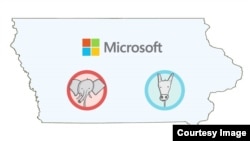It is a basic premise of democracy: Every vote counts. Unfortunately, the last time Republican voters in Iowa participated in a caucus, some votes were lost because of an error in the reporting process, and they wound up not counting.
This time around, Iowa officials are hoping new technology developed by Microsoft will help prevent a repeat of the 2012 disaster. Microsoft has created a pair of mobile apps, one for each party, to help tally and report caucus results.
It’s going to make the reporting process quicker, more efficient, and more accurate,” said Charlie Szold, communications director for the Republican Party of Iowa, in an interview with VOA.
What happened in 2012?
In past elections, Iowa caucus precinct captains would report voting results in to the state level by punching the results in a telephone.
“You’d call a number and you’d have to literally type into your phone’s keypad how many votes for each candidate,” said Szold.
“So you wouldn’t actually see what you were inputting, you would just have to know you were doing it correctly. That led to transposition errors, maybe you hit the '5' button one too many times, something like that,” he said.
Somewhere in that reporting process in 2012, mistakes were made. But GOP officials didn’t realize until later, after they had already declared Mitt Romney the winner. Weeks later, a recount revealed Rick Santorum had actually won the state.
The mistake deprived Santorum of crucial momentum heading into the next primary, which he lost to Romney, who eventually became the GOP nominee. It also meant that voting results from eight precincts were lost forever.
The new app has internal checks to make sure that any similar errors are caught, according to Szold.
“Anything that seems out of the ordinary gets flagged, so we can call the precincts and ask them if they really did intend to register 5,000 votes for one candidate when the whole precinct has never reported more than 50 votes in total before,” he said.
Apprehensions about new app?
Both parties have been working for months to train caucus organizers on the new apps. And although there is a degree of uneasiness that comes with the introduction of any new technology, officials are confident things will go smoothly.
“We’ve been spending a lot of time making sure that all our chairs in all the 1681 precinct caucuses are comfortable using the app and have an understanding of all the information that needs to be inputted,” said Josh Levitt, press secretary for the Iowa Democratic Party.
As a precaution, the traditional phone-reporting system will remain in place, in case anyone is not comfortable with the new system, Levitt told VOA.
Bipartisan effort
For Microsoft’s Stan Freck, who helped oversee the project, developing the new app seemed like a bipartisan way for the company to become involved in the U.S. election process. He said it wasn’t only a response to the 2012 miscount.
“We just thought it was an opportunity to raise the bar into a space that we think of as very important for the American population and for the country as a whole,” Freck told VOA.
Freck envisions that in future elections, technology will become a larger part of the voting-and-reporting process.
“I think more and more we’re going to see as generational shifts happen, voters and people who are involved in the political process expecting to be able to do the activities they’re asked to do as part of the political process using their smartphones, using their technology, using the Internet,” he said.







